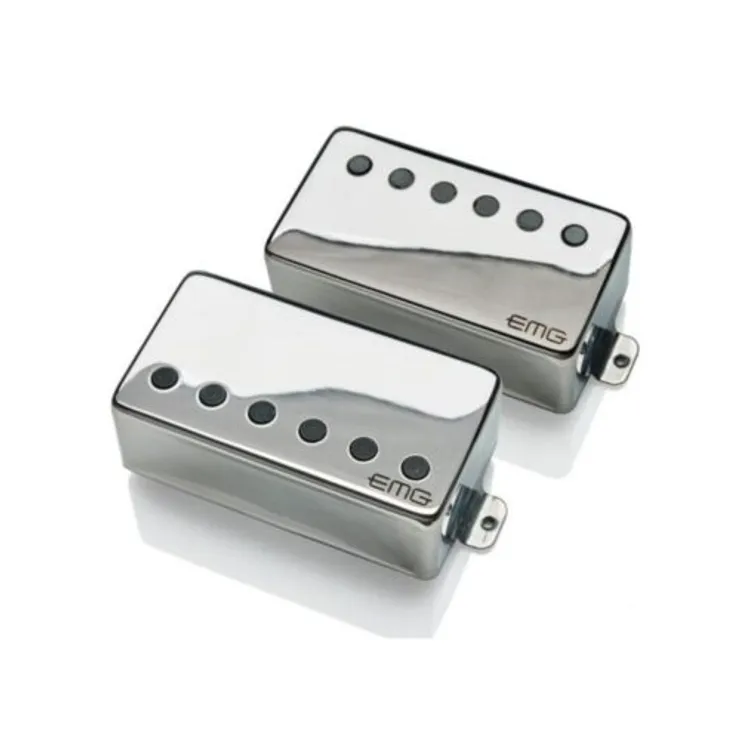In electric guitars and basses, pickups are the kingmaker when it comes to tone production. But with so many options out there, one of the most frequently asked questions is: are active pickups better than passive pickups?
What Are Pickups?
Before considering the difference between active and passive, let’s start at the beginning – what actually is a pickup? Essentially, pickups are magnets wrapped in a coil of wire that convert the vibrations of guitar strings into electrical signals. When the strings vibrate, they create a magnetic field that the pickups collect. They then send the resulting signals to an amplifier, which amplifies the signal and produces sound from a speaker.
What Are Active Pickups?
Active pickups are a type of pickup that require an external power source to operate, which is typically a 9-volt battery housed inside the guitar. Active pickups use a preamp to boost the signal that the pickups generate. This boosted signal results in a stronger, louder sound.
One of the most significant advantages of active pickups is their high output. Since a preamp powers them, they produce a much stronger signal than passive pickups. This stronger signal drives the amplifier harder, resulting in a more aggressive and punchy tone. Active pickups also benefit from a lower noise level. They can filter out unwanted noise and interference using their preamp, providing a cleaner signal and a more faithful tone.
Advantages of Active Pickups
Depending on your playing requirements, there are several pros that you might find when using active pickups:
High output: Active pickups produce a much stronger signal than passive pickups, providing a more aggressive tone.
Low noise level: Active pickups filter out unwanted noise and interference.
More headroom: With more headroom than passive pickups, active pickups can handle higher volumes without distorting.
Less susceptible to feedback: Active pickups are less prone to feedback than passive pickups, so you can play at higher volumes without worrying about unwanted feedback.
Disadvantages of Active Pickups
While active pickups have plenty going for them, consider if any of the following points won’t suit your needs:
Battery life: Active pickups require an external power source to operate. As such, you’ll need to replace the battery periodically.
Cost: Active pickups typically cost more than their passive counterparts.
Less dynamic range: Active pickups don’t have as much dynamic range as passive pickups. This means they can be less responsive to pick attack and volume changes.
Installation: If your guitar has passive pickups, you might need to use a router on your guitar body to add a cavity for a power supply.
What Are Passive Pickups?
Passive pickups are the most common type of pickup found on electric guitars. They are simple and reliable, producing a warm, natural, and expressive tone. Unlike active pickups, passive pickups don’t need an external power source. They solely rely on the magnetic field that the strings generate to produce an electrical signal. Passive pickups don’t have a preamp to boost the signal, so it will be weaker than the signal that active pickups produce.
Advantages of Passive Pickups
If the following advantages sound ideal, then passive pickups could be for you:
Natural tone: Passive pickups produce a warm and natural tone that many guitarists prefer.
More expressive: Passive pickups allow players to better capture the nuances and articulations of their performance,
No battery required: Passive pickups don’t need an external power source to operate, so you don’t need to worry about replacing batteries.
Affordability: Passive pickups are typically less expensive than active pickups.
Dynamic range: Passive pickups have a greater dynamic range than active pickups. They are more responsive to changes in attack and volume.
Disadvantages of Passive Pickups
There’s a lot to love about passive pickups, but carefully consider if any of the following disadvantages are dealbreakers for you:
Low output: Compared with active pickups, passive pickups produce a weaker signal that doesn’t drive an amplifier as hard. This weaker signal translates to a less aggressive tone.
Susceptible to noise: With a preamp to filter the signal, passive pickups are more vulnerable to unwanted noise and interference, which can result in a less pristine tone.
Limited headroom: Passive pickups have limited headroom, so they can’t handle higher volumes without distorting.
Are Active Pickups Better Than Passive Pickups?
The answer to which type of pickup is best is not as straightforward as you might think. In truth, both active and passive pickups have their own strengths and weaknesses. Ultimately, the choice between the two is subjective and comes down to your audio preferences and the style of music you want to play.
If you are looking for a high output and aggressive tone, active pickups are almost certainly the way to go. They are perfect for metal and other genres requiring more power and distortion.
However, if you are trying to get a warmer, more natural tone that responds better to accents, then passive pickups are perfect. They are the go-to choice for blues, jazz, and other genres that ask for a more subtle and nuanced sound.
Are Active Pickups Better for Metal?
If you trade in downtuned, cranked guitars, then active pickups are probably for you. The high output, hot tone they create is perfect for crushingly heavy distorted guitar. It’s also important to remember that active pickups are less susceptible to feedback, which is critical when playing at high volumes.
Find Your Perfect Active or Passive Pickup Guitar
When trying to find the right guitar to help you craft the tone you’re looking for, deciding on details like which pickups you need can be daunting. There are many factors to consider, including the type of music you play and how you play it. If you are unsure which pickups to choose, it’s always worth trying to play as many as possible so that you can hear them in the flesh and see which one best fits your needs. But once you know which pickups might suit you, why not try our Finder tool? In seconds, you can enter your requirements, such as pickup type and budget, and narrow down the search for your perfect guitar.

